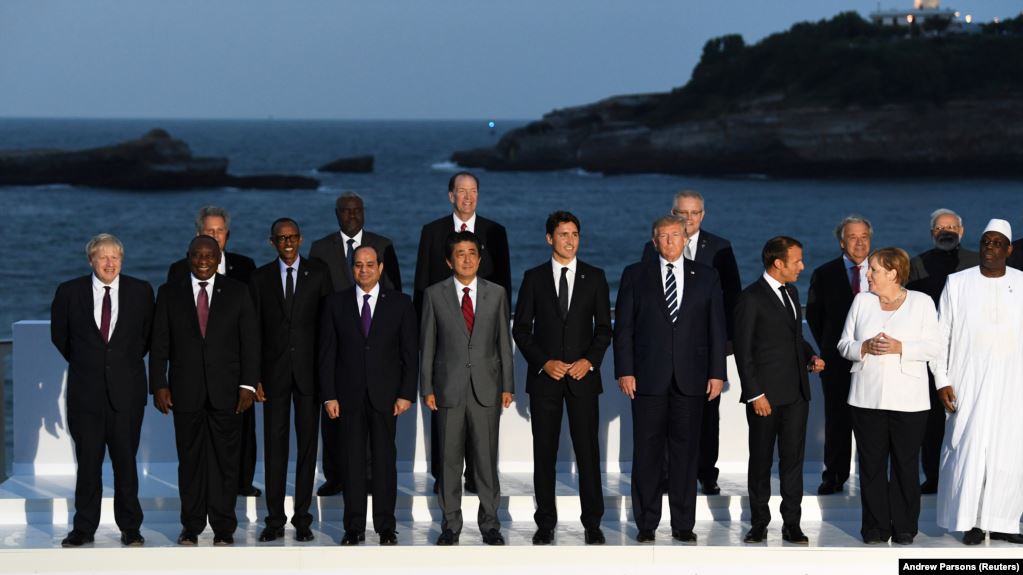
FRANCE – World leaders pose for a a photograph during the G7 summit in Biarritz on August 25, 2019.
By Polygraph
“How this made Kyiv more suitable to be invited to the club of leading economies, even as a guest, Tusk did not explain.” Source: Russian state broadcaster RT, August 24, 2019
MISLEADING
RT selectively edited Tusk’s comments.
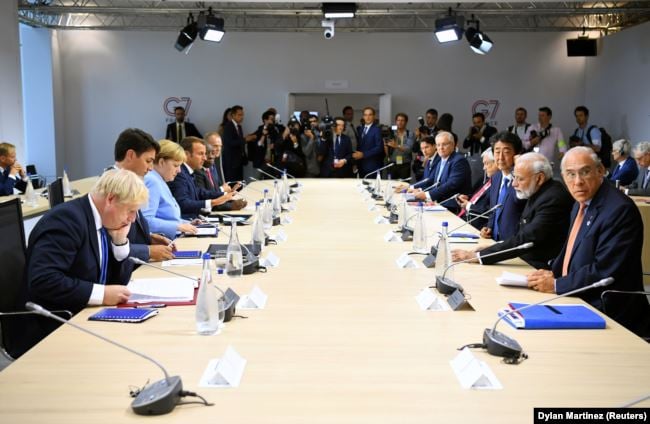
EU Council President, Donald Tusk, also present at the dinner, strongly came out against the idea of readmitting Russia, after the G7 members suspended their own participation in the forum in 2014 because of Moscow’s annexation of Ukraine’s Crimean peninsula.
In 2017 Russia announced it would permanently leave the so-called Group of Eight (the G7 including Russia), following the 2014 move by member states to suspend their own participation in the forum. Tusk also referred to a previous call by Trump for Russia’s readmission to the forum.
“One year ago, in Canada, President Trump suggested re-inviting Russia to G7, stating openly that Crimea’s annexation by Russia was partially justified. And that we should accept this fact,” said Tusk.
European Council President Donald Tusk has rejected U.S. President Donald Trump’s suggestion that Russia be readmitted to the G7. Read more here: https://t.co/mR1j7F76VU pic.twitter.com/WzbynaFaHr
— Radio Free Europe/Radio Liberty (@RFERL) August 25, 2019
“Under no condition can we agree with this logic.”
Tusk said Russia had failed to rectify the factors leading to the G8 suspension, while new reasons justified Russia’s continued exclusion, including Moscow’s detention of 24 Ukrainian sailors who, along with their three ships, were captured last November while heading to the Kerch Strait, the only passage between the Black Sea and the Sea of Azov.
Polygraph.info video fact check by Nik Yarst.
Tusk added it would be better to invite Ukraine’s president to the next G7 meeting, prompting a response by Russian-state broadcaster RT.
“Tusk’s logic was based on the fact that Russia does not ‘deserve’ politically to be readmitted to the Group of Seven, also because of the incident in the Azov Sea, when three Ukrainian Navy ships violated Russian territorial waters and provoked an hours-long standoff,” RT wrote.
“How this made Kyiv more suitable to be invited to the club of leading economies, even as a guest, Tusk did not explain. According to the International Monetary Fund (IMF), in 2018 Ukraine was ranked as Europe’s poorest country and took 162nd position among 227 world nations in terms of GDP per capita.”
Macron and staff walking up to the morning session at G7.
On the menu today: strategic/security agenda and global economy. Aka trade, WTO reform, Ukraine/Russia, Iran… pic.twitter.com/gBv2C7DM6j
— Rym Momtaz ريم ممتاز (@RymMomtaz) August 25, 2019
The RT report, however, both misrepresents the Kerch incident while also omitting key aspects of Tusk’s comments, which themselves tie into what the G7 constitutes as a forum.
First, there is no evidence Ukraine violated Russia’s territorial waters. While international law in regards to navigating the Kerch Straight and the Sea of Azov is murky, Russia’s right to Crimea (and thus the waters surrounding it) are not recognized. Speaking with Polygraph.info in April, Günther Handl, a professor of international law at Tulane University, said that Ukraine is essentially moving through its own internal waters when traversing the Sea of Azov and Kerch Strait.
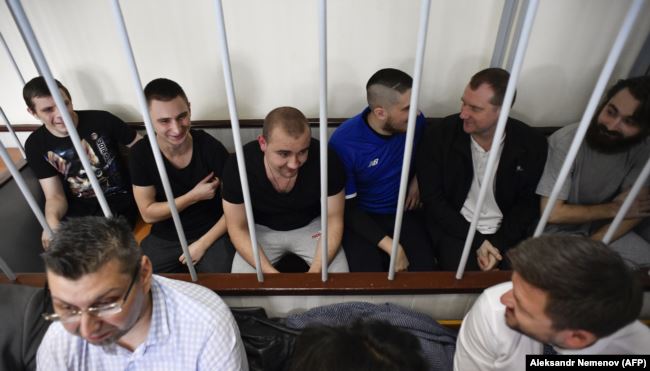
Handl added that the legal status of Crimea could be immaterial, as the regime of innocent passage or transit passage should have applied to the Ukrainian vessels, making any Russian attempts to police the waters illegal.
In May, the UN-mandated International Tribunal for the Law of the Sea ruled that Russia must immediately release the Ukrainian ships and sailors.
Next, Tusk made his logic backing Ukraine’s presence at the next G7 summit over Russia’s explicit in the portion of his comments RT withheld from the report.
“When Russia was invited to G7 for the first time, it was believed that it would pursue the path of liberal democracy, rule of law, and human rights,” Tusk said. “Is there anyone among us, who can say with full conviction, not out of business calculation, that Russia is on that path?”
It was within this context that Tusk said inviting Ukraine (“as a guest, of course”) would be more appropriate than inviting Russia.
Moreover, Russia’s actual admission into the G8 was based on political and not economic considerations.
As noted by Polygraph.info:
“In 1998, under President Bill Clinton, Russia was accepted into the G7, transforming this informal bloc of the wealthiest democracies into the G8. The U.S. Department of the Treasury then coordinated with the economic and financial ministries of other member countries to integrate Russia, which at that time had a small economy and large foreign debt, into the global economic system.”
In 1998, Russia’s economy collapsed, with its GDP contracting 5.3% year-on-year to 271 billion dollars, with GDP per capita hitting its lowest level in the history of the Russian Federation.
Even as its economic fortunes would improve, the Russian Federation has never been a major advanced economy, as defined by International Monetary Fund criteria.
Russia's 1998 Financial Crisis in the Regions: A Case Study pic.twitter.com/9OnTMsyRPs more: http://t.co/TlfrsOTzPG HT @bweglarczyk
— Justyna Król (@justynakrol) January 22, 2014
Writing for the Brookings Institute in 2006, former Deputy Secretary of State Strob Talbott noted the following:
“Back in 1998, leaders of what was then the G7 invited Boris Yeltsin to join their ranks. They hoped to encourage Russia to keep moving toward building a pluralistic political system, strengthening the rule of law, ensuring an independent judiciary and integrating with the global economy — principles that were written into joint statements.”
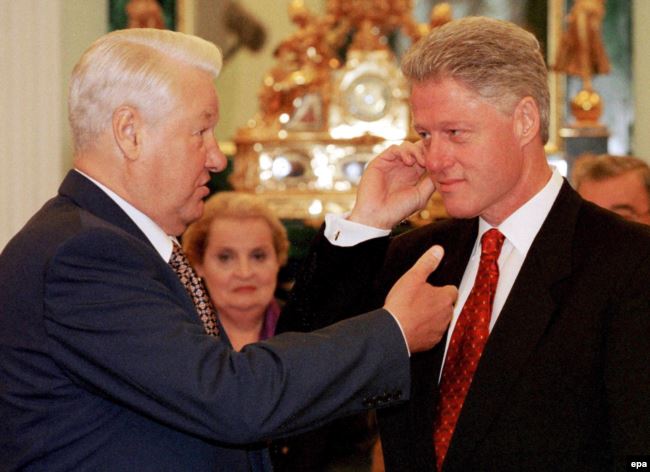
That view was mirrored by E. Wayne Merry, a Senior Fellow for Europe and Eurasia at the American Foreign Policy Council.
“G8 membership was given to Russia not because it qualified, but to encourage Moscow’s adherence to Western political standards and economic practices as it sought to rebuild itself following the collapse of the Soviet state,” Merry wrote. Merry noted that Moscow itself had “lobbied hard for full admission” to the G8 as “acknowledgement of post-Soviet Russia’s democratic transformation.”
He added that as an informal body with no founding charter, permanent secretariat nor status within the UN system, “the G8 was what its members collectively chose it to be, existing and functioning because leaders of a small group of governments willed it so.”
The same logic applies to the G7.
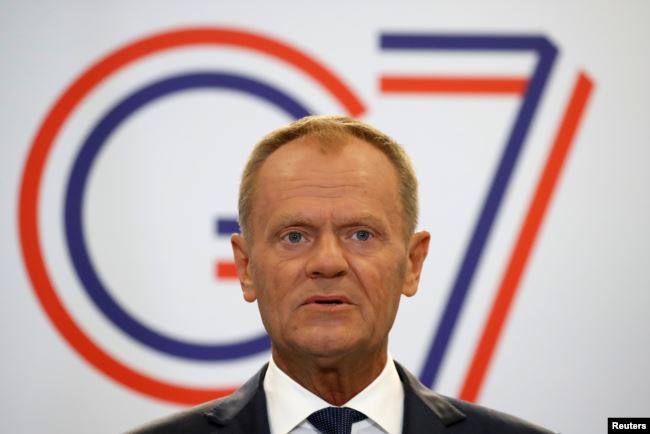
Tusk’s comments regarding Ukraine’s greater suitability to be invited to the next G7 summit, as a guest, were not based on the size of the country’s economy or its economic development. Along with referring to Russian aggression, Tusk said he wanted “to hear the opinion of the new president.”
Tusk is referring to Ukrainian president Volodymyr Zelensky, whose victory in the 2019 presidential election was proceeded by a smooth transfer of power, which was hailed as a “great achievement.”
Polygraph.info therefore finds RT’s comments to be misleading.
By Polygraph




